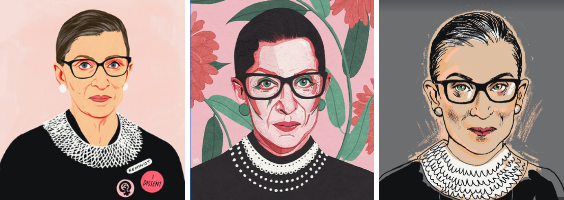The news of Ruth Bader Ginsburg’s passing on Friday sent shockwaves of feelings throughout the country—grief and sadness for the loss of this brilliant and powerful leader, followed by fear, panic, and uncertainty for what the reality of her absence means for our future, especially just weeks before the election.
As I worked through these feelings, as I’m sure is true for many of you, there was one in particular that eventually enveloped me: gratitude.
Gratitude for this feminist icon, this trailblazer for LGBTQ+ rights, gender equity, and reproductive and disability justice. Whether through monumental majority decisions, or blistering dissents, RBG saw what was at the core of every single ruling: the actual people who would be impacted by those decisions. From her assertion that gender equality is a constitutional right, to fighting to protect the 1965 Voting Rights Act, to striking down harmful restrictions on abortion, to granting marriage equality in all 50 states—and so, so very much more—this brave woman was defined by her willingness to dissent and advocate far beyond the courtroom.
My life, and the lives of so many, are different because of her courage, brilliance, and perseverance.
In many ways, it feels wrong to think of her passing in terms of the social and political impacts it will have. But RBG knew that this truth was likely a reality, and she held on for as long as she could, given how much was riding on her continued presence in the Supreme Court. I cannot begin to imagine what the pressure of that weight must have felt like, and I sincerely hope she found the peace she deserves before passing from a life fully lived, with purpose, integrity, and heart.
Her passing is a stark reminder that our democracy is broken if it hinges so heavily on one person.
All of us who were filled with panic upon hearing of her death—all who have felt so viscerally this shockwave—we will honor her passing, and the passing of our other movement ancestors who have put their lives on the line for justice, by picking up where they left off, and helping to grow the work they started so that it meets the needs of everyone in our communities. This is our collective work for change.
Ginsburg was an icon, trailblazer, and more—and she was also human. The impact of some of her decisions on the bench did not always benefit communities equally, and there was real, lasting harm done by some of her early decisions, particularly around tribal sovereignty. We can hold that complexity, and understand that one of Ruth Bader Ginsburg’s many strengths was her ability to evolve. She grew to regret her earlier stance on tribal sovereignty, and this can be a reminder of the importance of letting our heroes and heroines be human—growing, learning, changing, real people.
Throughout her life, Ruth Bader Ginsburg showed the impact that one person can have in the fight for justice. While all of us have different roles to play in this fight, she is proof that we all can find ways to leave the world better than we found it.
Today, we honor the impact, the legacy, and the life of Ruth Bader Ginsburg—and we can do it best by each committing to do more in this fight.
Katie Carter is Pride Foundation CEO.
